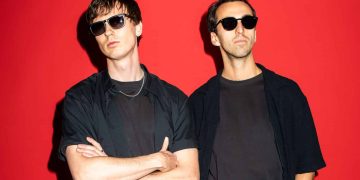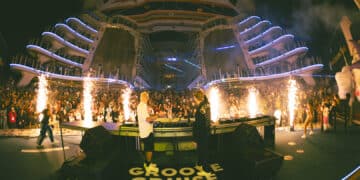Disco Donnie took some time before the end of the year to reflect on three decades of Disco Presents, the opening of SILO Dallas, the state of the festival scene, and more.
The dance music scene is seemingly ever-changing, but one of the constants that’s been a force to be reckoned with over the past three decades is Disco Donnie. From his humble beginnings throwing warehouse shows in the ’90s and becoming a major player in what would become SFX in the 2010s to buying back his company, Disco Presents (formerly Disco Donnie Presents), and setting his sights on nightlife with SILO Dallas, he’s left no stone unturned. Luckily, he had some time to chat with us before the end of the year.
Since 1994, Disco Donnie has thrown over 20,000 shows throughout North America and sold over 20 million tickets. That’s an impressive feat, especially because he’s been on the frontlines of the scene, battling the RAVE Act, the waxing and waning popularity of electronic music, a global pandemic, and more. Yet three decades after his start in New Orleans, Disco Donnie is just as energized to bring shows to the hungry masses.
I still wake up in the morning, and I’m still motivated as soon as my brain turns on. I still love doing this. For whatever reason or however I got here, I feel that this is what I was meant to do.
Disco Donnie
The biggest lesson Disco Donnie says he’s learned over the years is that “[he] shouldn’t have done this.” But as he laughed when he told us to tell people “not to be promoters” and that he “should’ve done some other job,” it was clear there was an actual lesson to be learned from him. “It’s the same lesson taught throughout history and time; it’s a constant. And that is to treat people how you want to be treated,” he said. “No matter how many people wrong you or anything like that, you just keep being yourself and trying to do things the right way. Eventually, you’ll find that it’ll come back to you tenfold.”
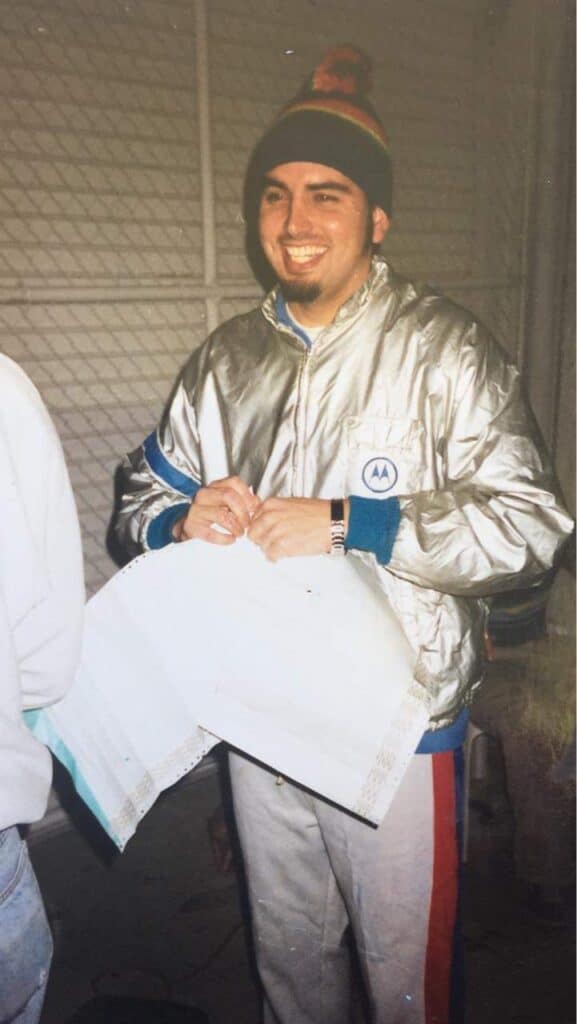
I’ve seen all the rises and the falls and all the episodes. And so I’ve seen this a million times. Every dog has its day. Everything comes, goes in and out, and comes back. And the same thing with electronic music. We were hot, then we weren’t, then we were hot, then we’re not, then we’re just, it’s just a constant cycle. So, the lifers that are here realize that it’s not a sprint, it’s a marathon.
Disco Donnie
The notion of things coming back around is deeply ingrained in Disco Donnie’s mind, as this mantra has been the case for him over the past three decades. The swings of the festival and nightlife scene have been just as apparent as the rise and fall of different genres’ popularity, much like drum and bass, which has grown in popularity over the past few years after sitting on the sidelines for over a decade.
Turn back the clock to the mid-’90s, and you’ll find Donnie throwing some of his first warehouse shows centered on drum and bass in New Orleans. “As a fan, I was a big drum and bass head in the ‘90s. I actually had a weekly, so all those big guys came through New Orleans in the ‘90s. That’s when it really started popping off,” he shared. But while the past ten years alone have seen some repetitive false starts on its comeback, according to Donnie, “It seems like it’s getting some momentum.”
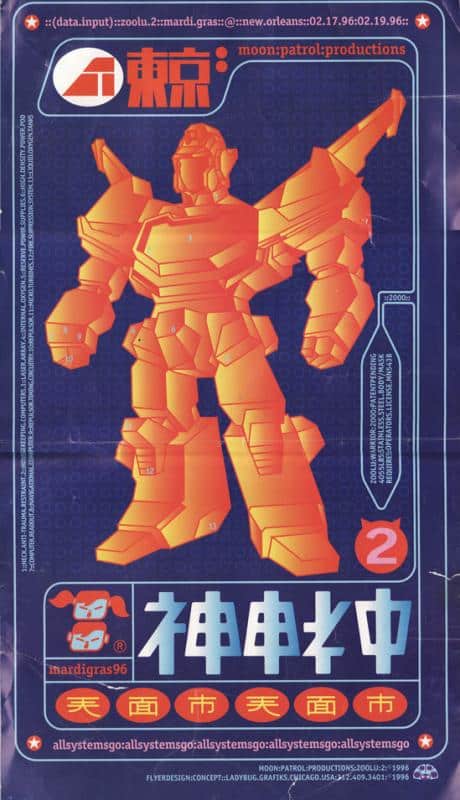
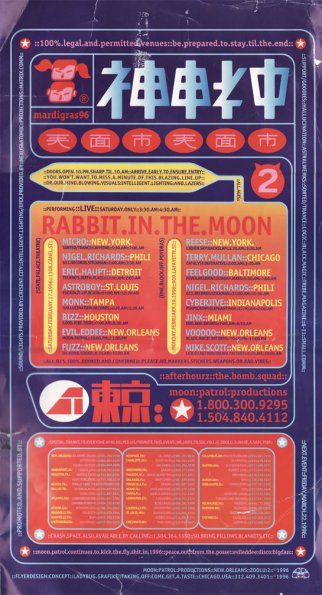
The resurgence of drum and bass isn’t the only thing that’s hit the scene as of late, as many in the community have been struck with nostalgia for the days of raves gone by. Classic house samples, throwback rave aesthetics, and more have entered the current era. Yet to Disco Donnie, there isn’t much he misses because it isn’t as different as it was back then. “To me, the scene is kind of the same,” he said. “We were projecting the visuals onto bedsheets, or we had rented TVs. So, the production value obviously has gone up. And even though the people have changed, the crowd has the same ideals.”
In the ‘90s, that early era was when people thought they were part of something that felt underground or part of something special, like a secret club. It wasn’t true, but people believed it. So I think the only things missing from then until now are the bedsheets and the fact that I’m part of some super secret Mickey Mouse Club. So, other than that, the ideals are still the same. It’s just way bigger and way brighter.
Disco Donnie
While not much has changed in Donnie’s eyes, there are still some significant differences in electronic music’s popularity and overall acceptance. He mentioned that artists are now on the radio and winning Grammy awards. He also brought up that technological changes have allowed people to have more information at their fingertips, whether to listen to electronic music or figure out which artists made a certain song.
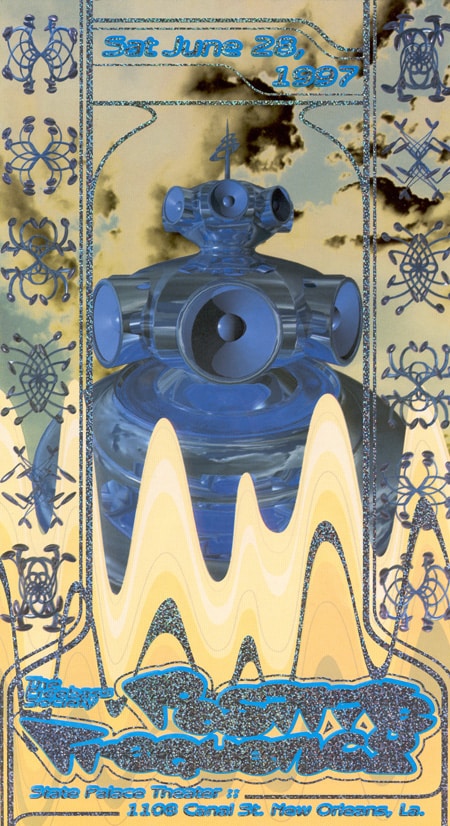
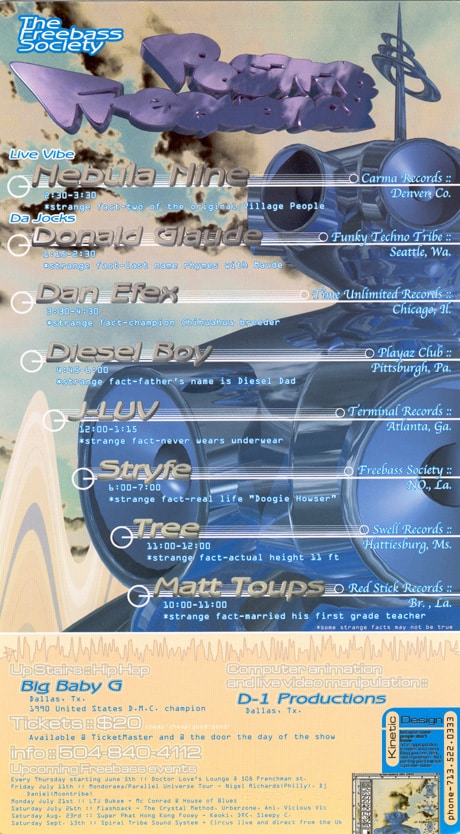
This bucked what had happened after 2001 when the scene was in shambles due to the RAVE Act, the rise in genres like hip-hop, and other aspects that impacted the US, such as 9/11. That year, “the whole EDM scene crashed,” according to Disco Donnie, and it’s been a lengthy path to recovery ever since then.
We were the lowest person on the totem pole. You didn’t want to tell anybody you were a rave promoter. We got knocked way down into the dirt. And so to build our way back up to now where it’s pretty much socially acceptable and everybody knows what it is and everybody’s talking about it, it was a lot. It seems like a no-brainer, but it was a long journey.
Disco Donnie
Part of the reason Disco Donnie has stayed afloat over the past 30 years has been his resistance, but the other aspect is his forward-thinking approach to how he’s dominated much of the country. Smaller markets have been the name of the game for him, with Disco Presents events finding a home in cities that aren’t necessarily considered hubs for dance music.
That all began in New Orleans, which Donnie called a “special place” and was one where he and his team “learned how to do events.” “We were doing raves, but nobody was paying attention to us because all of New Orleans is just crazy,” he said. “So, we were just another piece of the crazy puzzle.” But after years of throwing shows there, he set his sights beyond its borders while the scene was rocky.
Donnie had already fostered relationships with promoters in smaller markets and went to work to bring shows back to those places, oftentimes putting up the money to make them happen. He also began to utilize online ticket sales, allowing for more data to be collected on who was attending shows and giving them a leg up on the competition. Those aspects, paired with connectors while booking artists, helped him deepen his grip on those smaller markets.
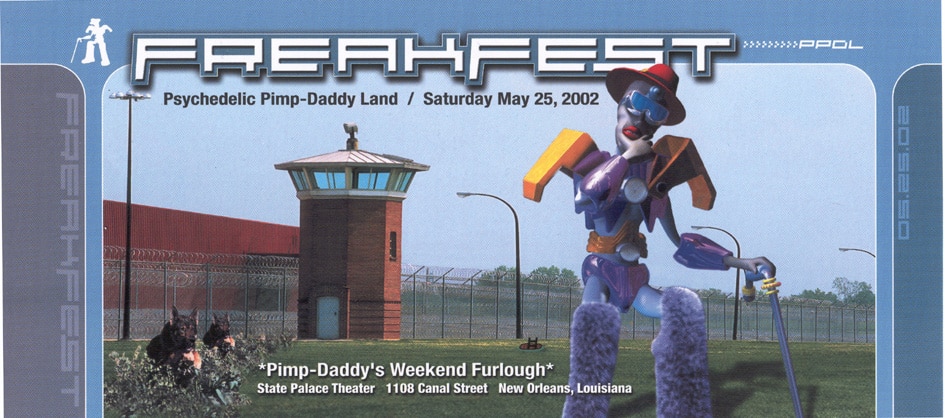
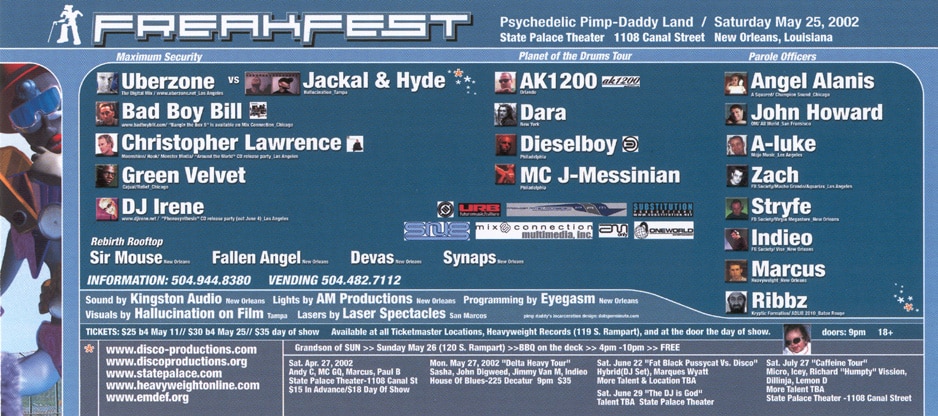
Smaller markets still make up much of Disco Donnie’s shows annually, with his branded events in places including Portland, Nashville, Tampa, and more. That doesn’t mean he hasn’t thrown shows in New York, Miami, LA, or Chicago, but selling tickets is far more difficult. “Those cities have multiple promoters there, so they’re trying to kill each other,” he said. “It’s basically a war zone. You have to work 10 times harder in one of those larger markets to be successful because of how competitive it is.”
It’s easier to enter a market where nobody’s competing, and you’re not banging your head against the wall because you’re the only one doing shows. That seems like a way better prospect than being in a fight every day.
Disco Donnie
Although Donnie’s events are spread throughout the country, he does have a solid claim on one market that’s been seemingly impenetrable over the past decade: Texas. “I did my first show in Austin in ‘96,” he said. “So I’ve been there for a long time under different iterations. But yeah, it’s where we do most of our shows and concentrate the most.”
Texas is where you’ll find some of his biggest festivals – Ubbi Dubbi, Freaky Deaky, and Lights All Night – along with his newest venture, SILO Dallas. This new nightclub isn’t the first that Donnie has invested in over the years, but it’s the first he’s owned. “It’s something I never really wanted to do,” he told us. “I always thought these things were cyclical, like the music. There’s always a new club opening up, and we’re very loyal to relationships. I want to do what’s best for the artist. So if I own my own venue, sometimes it wouldn’t be what’s best for the artist.”
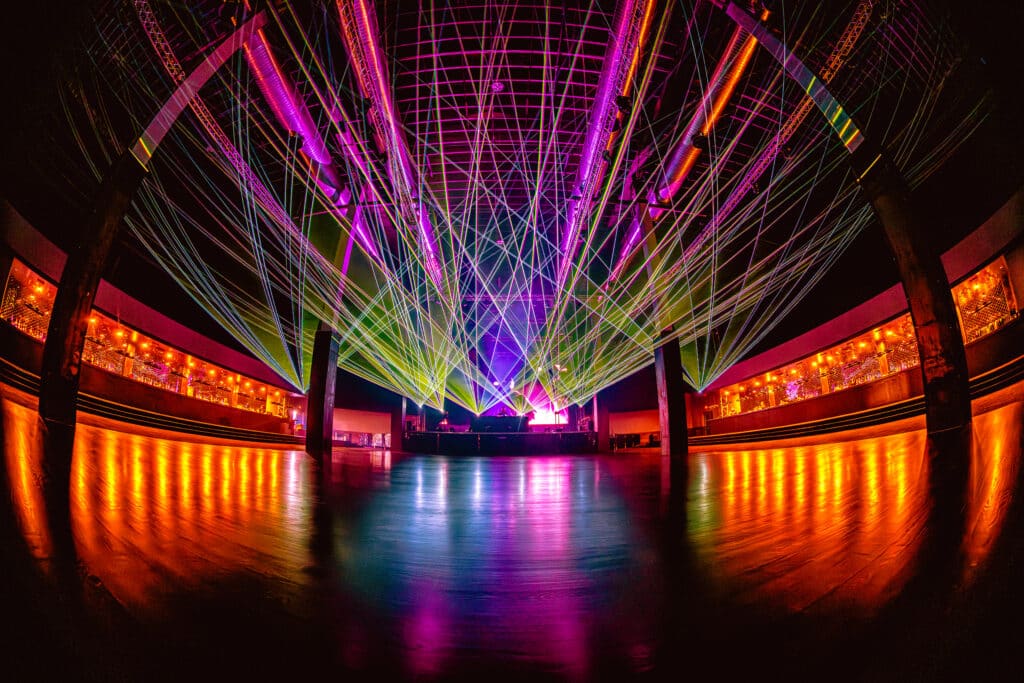
That promoter-first mindset also dripped into the other aspect he battled with internally, as he had fought with club owners for decades. “[Club owners were] always my nemesis. I would fight with them,” he said. “They’re letting people in the back door. They’re taking money to let people skip the line. So I always said I would never join that team, yet here I am. Now, I’m Thanos.”
The thing about Silo is it’s a special venue, and it has its own story. It’s not about you just having the best LEDs or the best lights. When you walk up to it, you know you’re going into something special. That’s a big selling point for the people that are going there right now. This isn’t a club. They’re going into a whole new world. And that’s what’s exciting to me.
Disco Donnie
The process of getting SILO Dallas open wasn’t easy, much like many other clubs that Disco Donnie had seen open over the years. According to him it took three years that were spent coming out of COVID-19, with new requirements and regulations from the city of Dallas. “It was crazy,” he said. “There were many times when I didn’t think it would happen.”
While he did his best not to fall into the trap other clubs had when it came to preemptively booking artists for an opening show, it came down to the wire with SILO Dallas. “We got our permit six hours before the Tiësto show on the day we opened,” he told us. “So I wasn’t that smart. And I did the same thing everybody else did. I didn’t want to be in that position. But it worked out.”
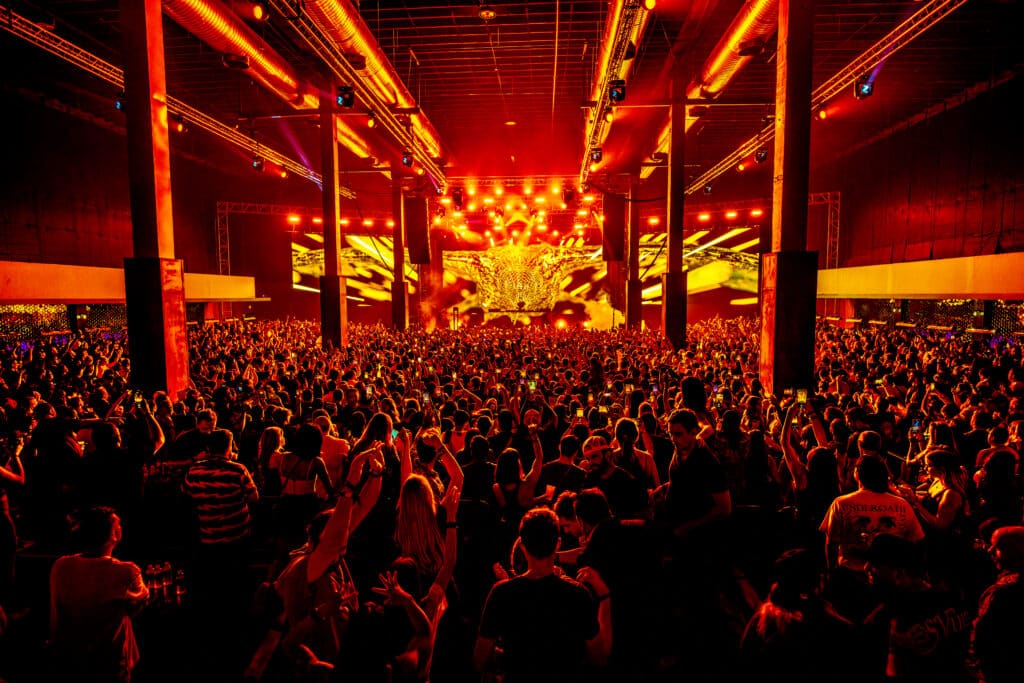
Since opening, SILO Dallas has been a rousing success. The aforementioned Tiësto show helped kick things off, and the following weeks brought in a laundry list of top-tier acts to the stage, including Kaskade, RL Grime, FISHER, Eric Prydz, deadmau5, REZZ, and more. Control over the bookings, production, drink prices, and more have also made this venue feel like “home” for Donnie and his team, and he intends to make it a place for everyone.
[Silo Dallas] really is for everybody. We’re going to have all kinds of different events in the venue. But it’s good that the ravers finally took the lead here. We’re driving a bus and saying, look, this is how you do it. You guys can get in here. We’re all-inclusive. Everybody’s the same. So jump on the bus with us, and we’ll help you.
Disco Donnie
Disco Donnie remarked that the goodwill that the venue has generated with the scene, the community around it, and Dallas as a whole “has been great.” It’s also breathed new life into him, as he returned from retirement as a talent buyer to help get the ball rolling for this new nightclub this past June. “It was a crazy ride to get from there to here,” he said. “It’s rejuvenated me because I’m in it. I know how much time and money went into it. I feel it’s pushed me forward to do better and make things better.”
[SILO Dallas] is still a work in progress. We still have lights in boxes in the back that haven’t been put up. So, there’s a lot of growth to go, but the feedback has been amazing so far. It makes you feel good, especially from the artists, agents, and managers.
Disco Donnie
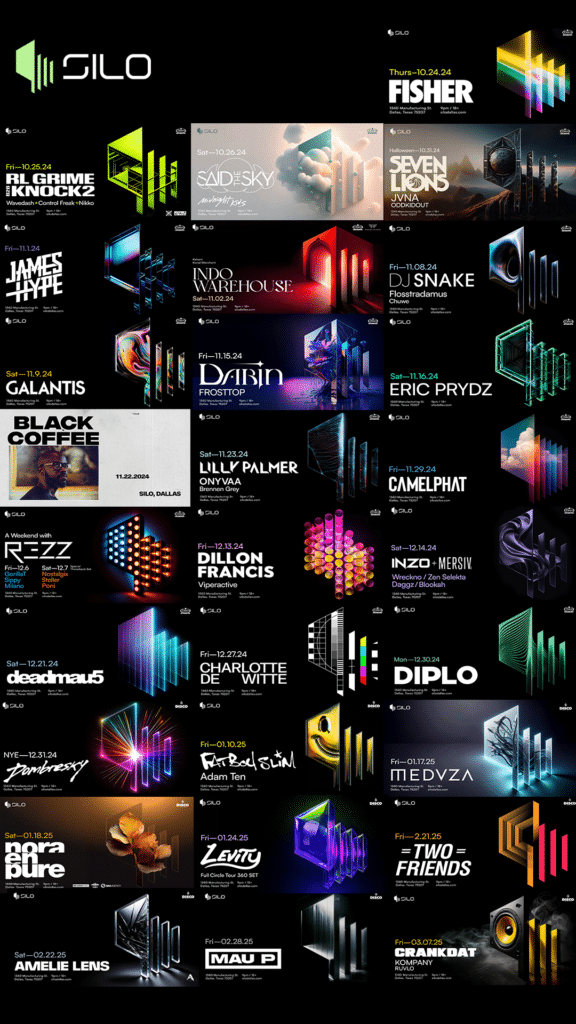
While his focus might currently be on SILO Dallas, Donnie still has his eyes locked on the state of the festival scene. The past few years have seen him openly discuss the higher-than-ever costs and other issues that have surfaced when throwing these massive weekend-long affairs, and there wasn’t a lot of optimism from him about the future of mid-level festivals.
“As far as the cost on the production side, it just doesn’t seem like there’s an end in sight to where they go,” Donnie said. “We’ve tried to use our kind of bulk buying and relationships to hold down the cost because the ticket cost can’t keep up with the fan. That’s why you see a lot of festivals that have had to close or not happen over the last two or three years; it doesn’t make any financial sense to do a festival.”
All the things that go into it, all the risk, the insurance; it’s very challenging. And a lot of times, you ask yourself, why? What are you actually doing this for? So I think you’ll see a lot more festivals probably folding in the next year or so. And hopefully, the ones that stay around and fight it out will have that second life.
Disco Donnie
“There are the Live Nations and AEGs of the world up at the top with all the money to blow, and then there are the small boutiques,” he said. “Others are sort of in the middle of that. And I don’t know how much they can persist in this era.” It’s not all doom and gloom for the festival scene; according to Donnie, “it’s just on the downside” of the cycle that he’s seen repeatedly over the past three decades.
One of the most significant downturns in the past era occurred when promoters began to be targeted after the implementation of “crack house” laws and the passage of the RAVE Act. Donnie had let DanceSafe pass out literature about drugs at his shows, which was turned against him during the prosecution that occurred during that time.
Over two decades later, the culture has shifted to be more accepting, but there’s still a lot of work to be done. “We’re moving in the right direction, but it’s not fast enough for many people,” he said. “So I’m glad that a lot of the stuff’s being accepted, like education. I think it’s gonna take more time before there’s testing, but it will eventually happen.”
People are going to go to festivals, whether rock or country or hip hop or whatever, and people will be people and do what they do. And we need to try to keep those people safe. The more they’re informed, or if we can give them extra tools to be safe, the better for everyone.
Disco Donnie
Disco Presents’ events have implemented several strategies to keep attendees safe and informed. They’ve hosted harm reduction booths, posted information, and have places where people can go if they’re not feeling safe or mentally well. “It’s a different ballgame when you’re dealing with different parts of the country; it just takes time,” he said, before mentioning how now everyone has Narcan on them, but five years ago, that would’ve been “a crazy thing.”
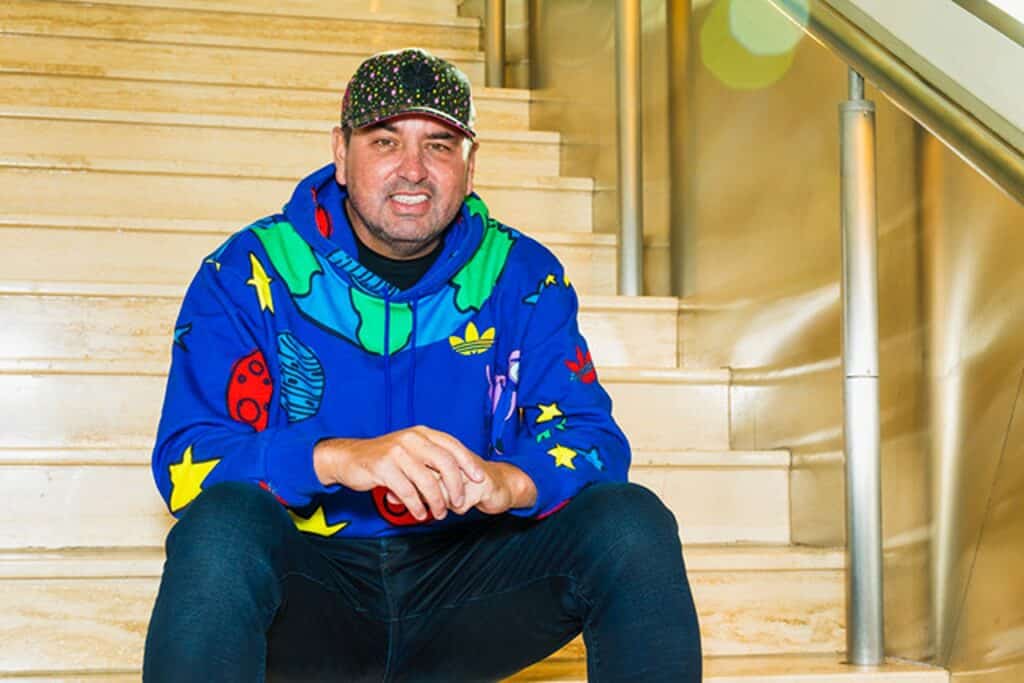
As they continue to help bring harm reduction to the forefront, Disco Presents is also looking toward the future of the shows they throw and the scene as a whole. According to Donnie, next year will see them “shave off some of the stuff we’re doing, concentrate on what’s working, and work with the people we enjoy working with while also doing things that don’t have a lot of headwinds.” “After you’ve been doing this for so long, you just want to enjoy it,” he said.
Trying to do shows in a million places might not be the end-all-be-all. If I tried to open a venue in Dallas five years ago, it wouldn’t have been as successful because this is the right time and the right place. And I have some other deals on venues in other cities that don’t have anything.
Disco Donnie
While Donnie didn’t disclose the venues or cities he’s had his eyes on, he did remark how different things are compared to the past. “What’s crazy is that we’ve been trying to fool landlords into giving us warehouses for 30 years,” he told us. “Now, when I go to these cities and look at warehouses, the real estate agents say, “The owner wants to make this a music venue.” I’m like, what? What is this kind of bizarro world? Where were you 30 years ago?”
If and when those new spaces surface, they will more than likely be aligned with the ethos he’s brought to SILO Dallas. “We’re in this time right now because there are plenty of unique, special spaces out there that can be turned into music venues,” he said. “And that’s what people want to go to now.”
Our conversation closed with a brief discussion about the upcoming Super Bowl in New Orleans, which Donnie would’ve liked more if his team, the Saints, were playing. I couldn’t help but feel that parallel between the two, as both have experienced swings of highs and lows in the face of adversity over the past three decades. But if one thing was made clear from our chat, Disco Donnie and Disco Presents will keep fighting to keep the scene alive for years to come.






